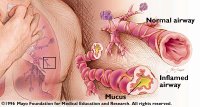Allergies - Leading chronic disease
Allergies are results of an overactive reaction of our immune system to substances that usually cause no reaction in most normal individuals. These substances are known as allergens that can trigger sneezing, wheezing, coughing and itching.
Allergies are not only bothersome, but they could also link to a variety of common and serious chronic respiratory illnesses such as sinusitis and the occasional life threatening asthma. However, with proper management and education, allergic diseases can be monitored and controlled. In fact, people with allergies and asthma can lead quite normal and productive lives.
The tendency to become allergic can also be an inherited characteristic. Several causative factors must be present for allergic sensitivity to be developed:
• The specific genes acquired from parents.
• The exposure to one or more allergens to which you have been made genetically sensitive.
• The extent and length of exposure.













